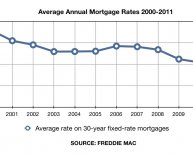
Best mortgage interest rates
When it comes time to buy a home, everyone wants to know where and how they can lock in the best mortgage rate. Be sure to do a little research ahead of time so you understand what factors determine you getting the best mortgage rate, and how you can prepare yourself with questions and knowledge as you evaluate lenders for your mortgage. See the tips below for helping you understand how you can access the best mortgage rate:
 Mortgage Rate Primary Factors:
Mortgage Rate Primary Factors:
- Loan-to-Value Ratio
- Credit Score
- Type of Property Being Purchased
Lender’s Ability to Close on Time
Ask around regarding this factor. Lenders will always tell you they close on time, but their past performances will speak the most for how reliable they are on closing in a timely manner. Most mortgage transactions between 45–60 days to close but a good lender can still close a loan within 30 days.
Skill Level of Appraiser
Does your potential lender have their own panel of lenders or do they outsource a third-party appraiser? Always select a lender that employs their own panel of appraisers for more accurate results.
Questions to Ask Loan Officers
-
Are you a licensed mortgage banker?
Licensed mortgage bankers have to pass a difficult test as well as a background check. This is the person you will be giving some of your most private financial information to—be sure to select a skilled and trustworthy mortgage banker.
-
Do you maintain your own panel of appraisers, or do you outsource them through a third-party vendor?
The evidence over the last few years shows that third-party vendors aren’t as accurate or accountable as panel appraisers. If an outsourced appraiser does a poor job, the lender cannot take action to replace them, and outsourced appraisers know this. On the other hand, panel appraisers are often selected because they’re geographically-friendly to the location of the property and the lender can hold them accountable for poor appraisals. It’s critical to remember that the interest rate you’re locked quoted is only good if your appraisal is accurate. Interest rates and appraisals tie together due to your Loan-to-Value ratio—a primary determining factor for your interest rate.
-
Can you guarantee the closing date?
Your purchase agreement designates a required date to close the sale transaction. If that date isn’t achieved due to the lender’s inability to close on time, your purchase agreement can become voided and the seller can accept backup offers. Additionally, interest rate locks are for specified timeframes. If you go beyond the specified timeframe, you either lose your interest rate, or you pay a fee to extend the interest rate that you locked.
Questions About Mortgages
-
Should you pay to buy down your interest rate?
Often referred to as “points” or “discounts, ” you have the ability to pay a fee in order to receive a lower interest rate on your mortgage. For example, if you’re quoted an interest rate of 4.00%, you may be able to get 3.75% for the cost of one (1) point. One point is equal to 1% of your loan amount. Therefore, if you’re borrowing $200, 000, one point would be equal to $2, 000. The lower interest rate of 3.75% will save you around $500 per year in interest. So it will take four years for you to break even on paying for that point. If you plan to stay in the home well beyond the breakeven year, points are an option but you should consider the following before deciding on buying an interest rate down. If interest rates go down you may be stuck in your loan because you paid points and that cost likely cannot be recovered until after the break-even year.
-
Is a fixed-rate or adjustable-rate (ARM) mortgage better for you?
ARMs are adjustable-rate mortgages that are usually fixed for a period of 3, 5, 7, or 10 years, then become adjustable. ARMs typically start at a rate below fixed-rates mortgages, but generally come with a point or discount fee. If you plan on staying in your home for an extended number of years a fixed-rate mortgage is likely your best option. But if you plan on moving within that fixed-rate period on the ARM, you can save money by selecting an ARM as your mortgage type.
Mortgage Interest Rate: When to Be Cautious
In some cases lenders know you’re not able to lock in an interest rate immediately. This could be because you haven’t signed a purchase agreement for example. Therefore, they may quote an artificially low interest rate and closing cost just so they appear to have the lowest. Once you have a purchase agreement and are ready to lock the interest rate, the quoted rate is mysteriously no longer available and the new rate just happens to be higher. This is how some lenders can abuse borrowers.
Combat this situation by using the above questions to separate legitimate and illegitimate lenders. Next, after you’re quoted an interest rate, follow the interest rate market yourself and hold your lender accountable. This is fairly easy to do because interest rates are determined in the bond market, so if you follow the 10-year treasury bond yield from the day you’re quoted an interest rate and forward, you can see for yourself if rates are going up or down, and by how much. The 10-year bond yield can be found at various financial websites like cnbc.com. This way, when you are ready to lock an interest, you will already have a good idea with what’s happened to in the interest rates market since you were last quoted.

















